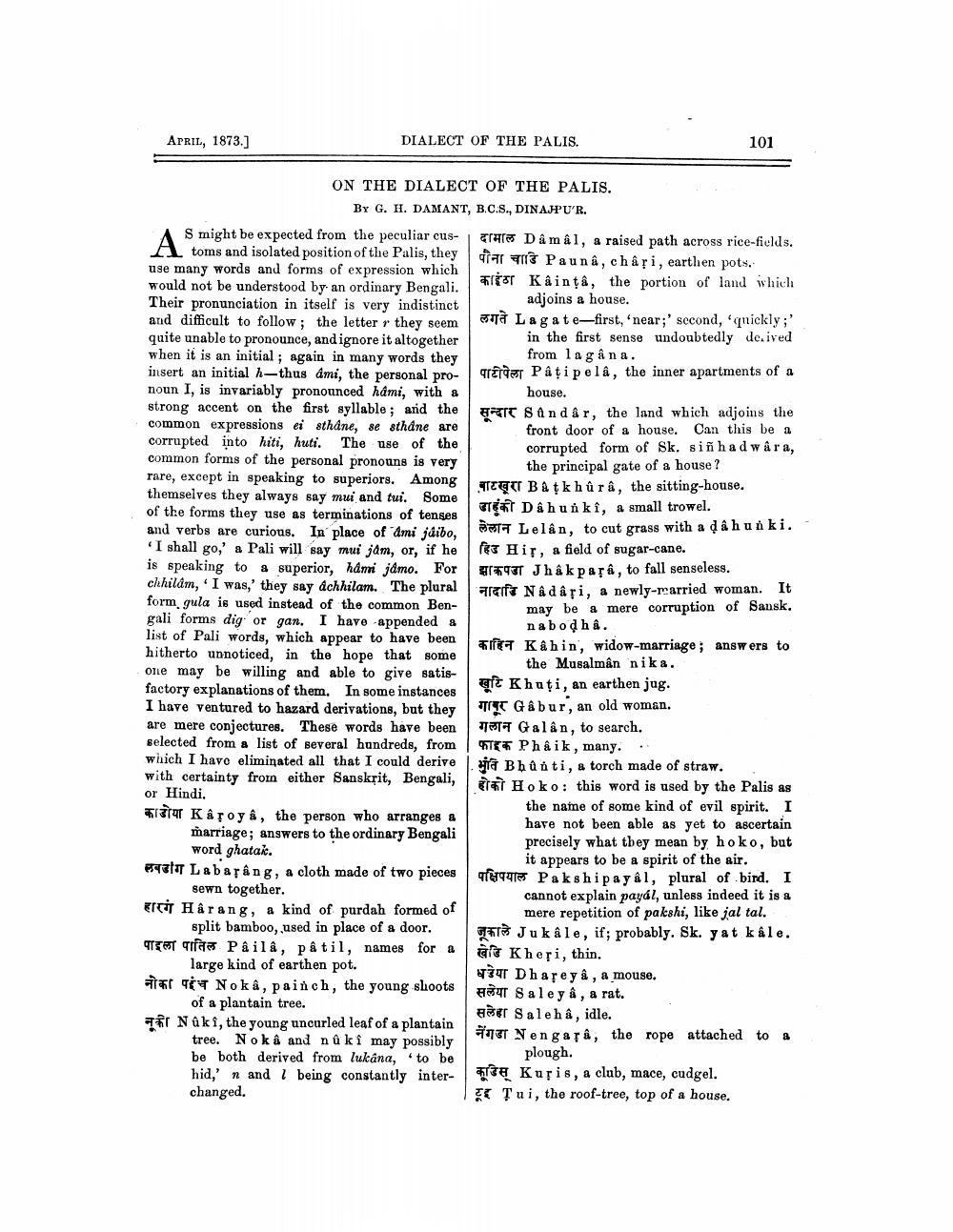________________
APRIL, 1873.]
DIALECT OF THE PALIS.
ON THE DIALECT OF THE PALIS. By G. H. DAMANT, B.C.S., DINAJPU'R.
S be from the peculiar cus
Atoms and isolated position of the Palis, they Paunâ, châri, earthen pots.
Dâmâl, a raised path across rice-fields.
Kâintâ, the portion of land which adjoins a house.
use many words and forms of expression which would not be understood by an ordinary Bengali. Their pronunciation in itself is very indistinct and difficult to follow; the letter r they seem quite unable to pronounce, and ignore it altogether when it is an initial; again in many words they insert an initial h-thus ámi, the personal pronoun I, is invariably pronounced hami, with a strong accent on the first syllable; and the common expressions ei sthâne, se sthâne are corrupted into hiti, huti. The use of the common forms of the personal pronouns is very rare, except in speaking to superiors. Among themselves they always say mui and tui. Some of the forms they use as terminations of tenses and verbs are curious. In place of ami jaibo, 'I shall go,' a Pali will sa say mui jam, or, if he is speaking to a superior, hami jamo. For chhilâm, I was,' they say áchhilam. The plural form gula is used instead of the common Bengali forms dig or gan. I have appended a list of Pali words, which appear to have been hitherto unnoticed, in the hope that some one may be willing and able to give satisfactory explanations of them. In some instances I have ventured to hazard derivations, but they are mere conjectures. These words have been selected from a list of several hundreds, from which I have eliminated all that I could derive with certainty from either Sanskrit, Bengali, or Hindi.
Pâ ilâ, pâtil, names for a large kind of earthen pot.
Noka, painch, the young shoots of a plantain tree.
Nûkî, the young uncurled leaf of a plantain tree. No kâ and nû ki may possibly be both derived from lukâna, 'to be hid,' n and being constantly interchanged.
Laga te-first, 'near;' second, 'quickly;' in the first sense undoubtedly de.ived from la gâna.
Pâtipelâ, the inner apartments of a house.
Sandar, the land which adjoins the front door of a house. Can this be a corrupted form of Sk. siñ had wara, the principal gate of a house? Batkhûrâ, the sitting-house. Dâhunkî, a small trowel. Lelân, to cut grass with a dâhunki. f Hir, a field of sugar-cane.
Jhakparâ, to fall senseless. af Nâdâri, a newly-married woman. It may be a mere corruption of Sansk. naboḍhâ.
Kâroy, the person who arranges a marriage; answers to the ordinary Bengali word ghatak.
Labarang, a cloth made of two pieces af sewn together.
Harang, a kind of purdah formed of split bamboo, used in place of a door.
101
Kahin, widow-marriage; answers to the Musalmân nika.
ft Khuti, an earthen jug.
G&bur, an old woman.
Galan, to search. Phâik, many.
Bhûnti, a torch made of straw.
Hoko: this word is used by the Palis as the name of some kind of evil spirit. I have not been able as yet to ascertain precisely what they mean by hoko, but it appears to be a spirit of the air.
Pakshipayal, plural of bird. I cannot explain payál, unless indeed it is a mere repetition of pakshi, like jal tal. Jukâle, if; probably. Sk. yat kale. Kheri, thin.
Dhareya, a mouse. Saley, a rat.
ar Saleh â, idle.
Nengar, the rope attached to a
plough.
Kuris, a club, mace, cudgel. Tui, the roof-tree, top of a house.




